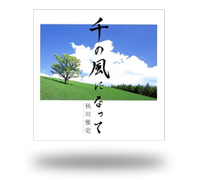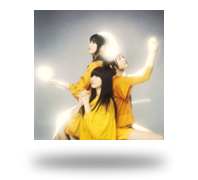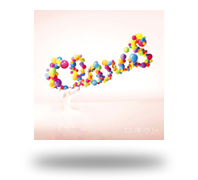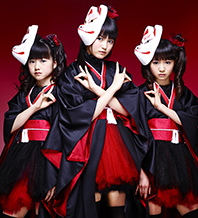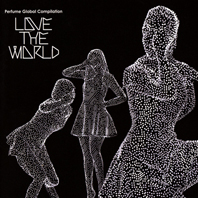Headlight - MONKEY MAJIK
About This Song
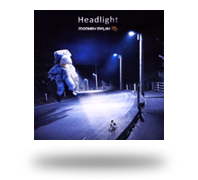
Title: Headlight
Lyrics: Maynard/Blaise/tax
Music: Maynard/Blaise
Song By: MONKEY MAJIK
Release Date: 26 Oct. 2011
Headlight is the 15th single of MONKEY MAJIK and was used as the theme song for "Tōhoku Smile Project" organized by a TV broadcast network for assisting victims of the Tōhoku Earthquake and Tsunami occured on 11th March 2011.
MONKEY MAJIK is a pop rock band consisting of two Canadian and two Japanese members. The band is based in Sendai city where the earthquake gave massive damage. The band members devoted themselves to physical volunteer activities such as clean-up and rescue during the aftermath of the disaster and they organized charity concerts.
The band members have been chosen as "Goodwill Ambassadors" for the 80th anniversary of Japanese-Canadian relations.

MONKEY MAJIK - Official Site
MONKEY MAJIK - Wikipedia
MONKEY MAJIK - iTunes
Tōhoku Earthquake and Tsunami - Wikipedia
Music Video
See Karaoke Song Album page before you start.
Original Music Video by MONKEY MAJIK
Karaoke with lyrics
Click here to view in larger size.
Lyrics


Meaning
Please note that song lyrics (and any art works) can have different interpretations.

I see... “sorry” disappears.
No luck. Got empty along the way.
Still now, I never thought you'd bring me down.
| そうか sōka | I see. |
|---|---|
| 失せる useru | to disappear, to vanish |
| 途中 tochū | along the way, on the way |
| ...で de | at Particle which indicates the location |
| 今も ima mo | even now, still 今 ima: now + も mo: also, too |

More wine. Copy of who?
So wise. Standing here.
What will happen from now? Change my life.
| 誰 dare | who |
|---|---|
| ...の no | of |
| 真似 mane | mimicry, imitation, copy |
| ここ koko | here |
| ...に ni | at Particle which indicates the location |
| 立って tatte | to stand 立つ tatsu: to stand |
| これから korekara | after this, from now これ kore: this + から kara: from |
| どうなる dōnaru | how will it be? どう dō: how + なる naru: to be, to become |

It's never gonna bring me down.
No, never gonna bring me down.
The sun rose and set with a smile.
| 昇って nobotte | to rise |
|---|---|
| 沈む shizumu | to set, to sink |
| 日 hi | the sun |
| ...が ga | Particle which indicates sentence subject |
| 笑っていた waratte(i)ta | was laughing, was smiling 笑う warau: to laugh, to smile ⇒ 笑っている waratteiru: is laughing (present progressive form) ⇒ 笑っていた waratteita: was laughing (past progressive form) |
| This word is pronounced "笑ってた waratteta (casual, spoken language)" not "笑っていた waratteita (formal, written language)" in the song. | |


Why do all people hold on to yesterday while they know sadness?
I've gotta live on 'cause now I'm moving on.
| どうして dōshite | why, for what reason |
|---|---|
| 人 hito | people, mankind |
| ...は wa | Particle which indicates the main topic of a sentence |
| みんな minna | everyone, everybody |
| 昨日 kinō | yesterday |
| ...に ni | to |
| 寄り添う yorisou | to get close, to cuddle up to 寄る yoru: to approach + 添う sou: to stay by one's side |
| の no | Particle which indicates question |
| 哀しみ kanashimi | sadness, sorrow |
| ...を o | Particle which indicates the object of a verb |
| 知っていながら shitteinagara |
despite knowing ... 知る shiru: to know ⇒ 知っている shitteiru: (present progressive form, indicates continuous state) + ながら nagara: while, despite, in spite of |

The world whispered and the kindness prevailed.
Thank you. With your voice, I rise up.
And now I'm moving on.
| 世界 sekai | the world |
|---|---|
| ...は wa | Particle which indicates the main topic of a sentence |
| 囁いて sasayaite | to whisper and ... 囁く sasayaku: to whisper, to murmur ⇒ 囁いて sasayaite (Verb ending [て te] is used to join two sentences) |
| やさしさ yasashisa | kindness, tenderness |
| ...に ni | by |
| 包まれた tsutsumareta | was surrownded, was wrapped 包む tsutsumu: to wrap, to envelop ⇒ 包まれる tsutsumareru: be wrapped (passive voice) ⇒ 包まれた tsutsumareta (past tense form) |
| ありがとう arigatō | Thank you. |
| キミの kimi no | your キミ kimi: you (mainly used by a male speaker in casual situation) + ...の no: (Particle which indicates possessive) |
| 声 koe | voice |
| ...で de | Particle which indicates cause of effect |
| たちあがる tachiagaru | to stand up, to rise up 立つ tatsu: to stand + 上がる agaru: to rise, to ascend |


Last night I woke up in the night.
It happened just once. But captured by a spider web all the time.
| たった tatta | only, merely |
|---|---|
| 一度きりの ichido kiri no | just once 一度 ichido: once, one time + きり kiri: only, just + の no: (Particle which indicates quantity) |
| いつも itsumo | always |
| 囚われ toraware | to be captured 囚われる torawareru: to be caught, to be captured |

See, just over there, a straight line. But trapped by the headlight.
What will happen from now? Change my mind.
| ほら hora | See., You see., Look! |
|---|---|
| すぐそこ sugu soko | right there, short distance away |
| ...に ni | Particle which indicates the location |
| ...は wa | Particle which indicates the main topic of a sentence |
| がんじがらめ ganjigarame |
bound hand and foot, immobile This word expresses physical or mental state at which you are tightly bound and cannot move at all. |
| headlight | Used as a metaphor for an external influence which binds the person At some interview, the Monkey Majik members mentioned that it is like a deer on the night road being blinded by car headlights and cannot move at all. (very Canadian!) |
| これから korekara | after this, from now これ kore: this + から kara: from |
| どうなる dōnaru | how will it be? どう dō: how + なる naru: to be, to become |

It's never gonna bring me down.
No, never gonna bring me down.
The sun rose and set with a smile.


All people hold on to tommorow because they know what joy is.
I've gotta live on 'cause now I'm moving on.
| そうして sōshite | and, like that |
|---|---|
| 人 hito | people, mankind |
| ...は wa | Particle which indicates the main topic of a sentence |
| みんな minna | everyone, everybody |
| 明日 ashita | tomorrow |
| ...に ni | to |
| 寄り添う yorisou | to get close, to cuddle up to 寄る yoru: to approach + 添う sou: to stay by one's side |
| の no | Particle which indicates emotional emphasis |
| 喜び yorokobi | joy, pleasure |
| ...を o | Particle which indicates the object of a verb |
| 知っているから shitteiru kara |
because one knows ... 知る shiru: to know ⇒ 知っている shitteiru: (present progressive form, indicates continuous state) + ...から kara: because |

The world whispered and the kindness prevailed.
Thank you. With your voice, I rise up.
And now I'm moving on.

I've been scared of old past memories.
It increases as the present time means more stronger and higher to me.
| 遠く tōku | far and ... 遠い tōi: far, distant ⇒ 遠く tōku: (Adjective ending [く ku] is used when it is followed by another adjective.) |
|---|---|
| 古い furui | old |
| 記憶 kioku | memory |
| ...に ni | of |
| 怯えていた obieteita | have been scared 怯える obieru: to be scared ⇒ 怯えている obieteiru: (present progressive form) ⇒ 怯えていた obieteita (past tense form, indicates continuous state) |
| This word is pronounced "怯えてた obieteta (casual, spoken language)" not "怯えていた obieteita (formal, written language)" in the song. | |
| 今 ima | now, the present time |
| ...が ga | Particle which indicates sentence subject |
| 強く tsuyoku | strong 強い tsuyoi: strong, powerful ⇒ 強く tsuyoku: (Adjective ending [く ku] is used when it is followed by another adjective.) |
| 高く takaku | high 高い takai: high ⇒ 高く takaku: (Adjective ending [く ku] is used when it is followed by another adjective.) |
| ...なる程に naru hodo ni | as it becomes more ... (as the present time becomes stronger and higher) |

When dawn breaks, all that will be gone.
That moment is approaching.
When will it come again?
| 夜 yoru | night |
|---|---|
| ...が ga | Particle which indicates sentence subject |
| 明ければ akereba | when (the night) ends 明ける akeru: to dawn, to end + ...れば reba: (indicates supposition, when) |
| 全て subete | all, the whole |
| なくして nakushite | to lose something なくす nakusu: to lose something, to get rid of |
| 迫りくる semarikuru | to be approaching, to be coming closer 迫る semaru: to approach、 to draw near + 来る kuru: to come |
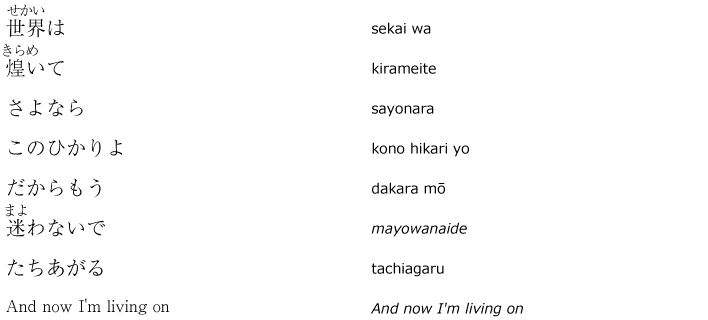
The world started to glitter. And I say good-bye to this light.
So, with no more hesitation, I rise up.
And now I'm living on.
| 世界 sekai | the world |
|---|---|
| ...は wa | Particle which indicates the main topic of a sentence |
| 煌いて kirameite | to glitter 煌く kirameku: to glitter, to sparkle |
| さよなら sayonara | good-bye (casual, spoken language) |
| この kono | this |
| 光 hikari | light (means "headlight - external binding influence") |
| よ yo | Sentence end suffix which indicates the person is talking to someone ("good-bye" to the light) |
| だから dakara | so, therefore |
| もう mō | anymore |
| 迷わないで mayowanai de |
with no hesitation 迷う mayou: to hesitate, to lose one's way + ないで naide: without doing ... |
| たちあがる tachiagaru | to stand up, to rise up 立つ tatsu: to stand + 上がる agaru: to rise, to ascend |

The world whispered and the kindness prevailed.
Thank you. With your voice, I rise up.
And now I'm moving on.


Related Topics
Karaoke Song Album - 千の風になって (A Thousand Winds) by Masafumi Akikawa
Karaoke Song Album - 逢いたくていま (aitakute ima) by MISIA
Karaoke Song Album - Dream Fighter by Perfume
Karaoke Song Album - コネクト (Connect) by ClariS



